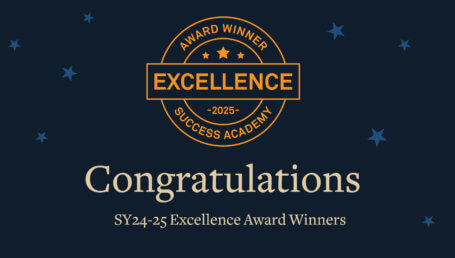
Robbie Sellers, program manager for High School Math Learning Quality, recently taught an eighth-grade math class that was a powerful exemplar of two key SA priorities: Getting effort on homework from scholars (in other words, pressing them to complete out-of-school learning with care and exertion so they utilize everything they already know and don’t make careless errors), and creating an intellectual environment where ideas about mathematics matter, are supported by logic and reasoning, and are communicated with clarity and precision
We were so inspired by Robbie’s teaching that we wanted to learn more about him — his methods and mindset. Before his current role, Robbie spent four years teaching math at SA Harlem East MS and two years as associate dean of math at HSLA-Manhattan. Below are excerpts from a conversation with him about becoming a math teacher, his early days at Success, why he’s excited about our focus on learning outside of school, and what he does to foster an intellectual environment in the classroom.
You look like you were born to be a teacher. How did you become an educator?
Ha! I never planned on going into education. I was a neuroscience major at Kenyon College and I wanted to go into research. But I worked in labs in college and I found labwork tedious. I ended up applying to Teach for America and was placed as a math teacher at a high school in eastern North Carolina. Those two years gave me glimmers of what makes teaching fun, but I wanted to go somewhere where I could reach my potential as an educator. SA struck me as an environment where I could do that.
What were your early years teaching at SA like?
I was not a good teacher my first year. My biggest gap was in classroom management and, looking back, I know that came from a lack of insistence. I had come from a culture of low expectations and it had become ingrained.
Was there a moment you remember as a big turning point for you?
I had an “aha” moment during my first year. I saw what other teachers were getting out of the kids and it was mind-blowing to me. It helped me completely reset on what kids were capable of.
Another moment was as math dean at the high school when I saw my former eighth graders take AP Calculus at HSLA-MA and struggle to be motivated and do homework. It was a wake-up call for me.
Our schools are intensively focused on getting effort in out-of-school learning to build scholar autonomy. Does that feel like a big change?
Yes, and I think it’s very exciting. I’ve never seen people talk about homework the way they are talking about it now. As an eighth-grade teacher, my co-teacher and I tried different strategies to cultivate scholar autonomy, but we didn’t have a clear approach to building authentic study habits. We would talk about homework completion but never about the content. Spending time on homework content is now a genuine part of teachers’ routine, and while we still have gaps in using it as effectively as we could, the fact that we are using it at all is a game changer. Kids are more motivated and invested in getting it done and understanding it because they know they have to talk about it in class.
In your lesson, the kids build on each other’s insights and seem truly engaged in the ideas. What are some of the things you do to create that kind of intellectual discourse?
I always craft my questions around some format of “what did you notice?” and “why?” — but it’s critical to have a clear intellectual purpose because students have to trust that you are taking them somewhere interesting. You need to know your lesson objective inside and out because when a kid says something that is not what you planned — and they definitely will — you have to know where to go with it. You also have to notice when kids have a great idea and that takes listening carefully so you can assess the quality of their thinking.
Having the flexibility to build on whatever scholars say seems hard. How do you prepare for that?
Identifying that intellectual purpose when you are planning a lesson is key. You want to identify the most interesting concept underlying the problem and its place in the larger stream of math understanding. For example, in this lesson, I knew my students were about to learn inverse operations and a lot of students struggle with what a variable is and the fact that variables have a value. That’s where I got the idea to consider all the values that the variable could be in the context of the word problem — and it was when I took away that context that the really rich conversation came in.
Second, when you’re planning, you have to take time to think through what the answer to your question might sound like. If you don’t, you won’t be able to recognize it when you hear it. And if you don’t notice and build on scholars’ thinking, you’ll end up making them follow your line of thinking — which devolves into a game of “guess what’s in my head.”
Any final advice about creating an intellectual classroom environment?
Know your intellectual purpose, assess the quality of student ideas, and have fun. Find the joy and kids will find it with you.










